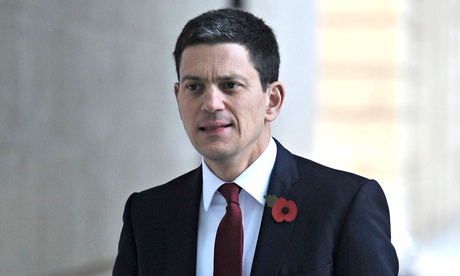
Photograph: Rex
David Miliband, the former foreign secretary, warned that the Ebola outbreak means that years of social and economic progress in Sierra Leone was at risk as he visited the country’s capital.
Now the head of the International Rescue Committee, which has some 500 staff between Liberia and Sierra Leone helping to combat Ebola , Miliband told the Guardian that this was a crucial moment and that treatment alone would not stop the death toll.
Miliband was in Freetown to thank and support the 330 staff there, he said, and to advocate for the people. “After ten years of pretty sustained progress, all that progress is now at stake,” he told the Guardian.
“One of the things that has become starkly clear to me in my visit is that there’s no grey area here between controlling the disease on the one hand and widespread disaster on the other. We’re at an absolute tipping point where either the disease is contained to the low tens of thousands or it becomes an epidemic of a very serious kind.”
Miliband was speaking as anxiety in the UK mounted over the possibility that there could be a cases in the country . Asked if he felt brave for flying into the outbreak, he said: “I don’t think the leader of an NGO can call himself brave for going somewhere when 300 staff of his organisation are working here every day. If it’s safe enough for my staff, it’s safe enough for me.
“There are no grounds for panic,” he added. “This is a hard disease to catch. It requires the exchange of body fluids. But there’s no reason not to take sensible precautions.”
In west Africa, there were three steps to controlling Ebola, he said. The first was prompt identification of people who have the disease. Some who have symptoms will have malaria or other diseases instead.
The second is isolation and safe treatment for those who have the disease – safe for the health workers. One of the tragedies was that it had lost a higher proportion of health workers than civilians. The third, he said, is the quick and safe disposal of the dead.
His organisation has been leading the 9-partner Ebola Response Consortium in Sierra Leone and supporting surveillance teams and working with community leaders, but in Liberia in November, it will open a 100-bed treatment centre. However, treatment alone is not the answer, he said.
“One of the things that I think is very important is that, although there’s been a lot of international attention to the number of treatment beds, we will never catch up with the disease simply by focusing in treatment beds. The absolute key is to stop the chain of transmission, which means local engagement, house by house, community by community, street by street explaining to local people what the dangers are and how they can mitigate them. That’s an absolute priority if this disease is not to get out of control.”
There needs to be a clear plan now that all organisations involved can support, he said. “John Kerry said we need a global plan to a global crisis. He’s right but without a local response that is community led and that is trusted by the local people, then however much money we throw at treatment centres, we’re not going to be able to get hold of the disease. At the moment the spread of the disease is outstripping the expansion of the treatment.”
On the streets of Freetown he had not seen dead bodies, he said, but “I have seen a lot of fear and a lot of resilience. This is a community that is going about its business.”
